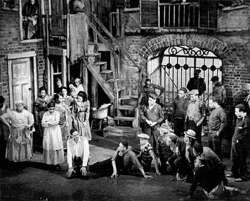Washington Post columnist, Ezra Klein wonders “Could this time have been different?”
Christina Romer had traveled to Chicago to perform an unpleasant task: she needed to scare her new boss. David Axelrod, Barack Obama’s top political adviser, had been very clear about that. He thought the president-elect needed to know exactly what he would be walking into when he took the oath of office in January. But it fell to Romer to deliver the bad news.
So Romer, a preternaturally cheerful economist whose expertise on the Great Depression made her an obvious choice to head the Council of Economic Advisers, gathered her tables and her charts and, on a snowy day in mid-December, sat down to explain to the next President of the United States of America exactly what sort of mess he was inheriting.
[]
By that point, the shape of the crisis was clear: The housing bubble had burst, and it was taking the banks that held the loans, and the households that did the borrowing, down with it. Romer estimated that the damage would be about $2 trillion over the next two years and recommended a $1.2 trillion stimulus plan. The political team balked at that price tag, but with the support of Larry Summers, the former Treasury secretary who would soon lead the National Economic Council, she persuaded the administration to support an $800 billion plan.
The next challenge was to persuade Congress. There had never been a stimulus that big, and there hadn’t been many financial crises this severe.
[]
Romer and Bernstein gathered data from the Federal Reserve, from Mark Zandi at Moody’s, from anywhere they could think of. The incoming administration loved their report and wanted to release it publicly. Romer took it home over Christmas to double-check, rewrite and pick over. At 6 a.m. Jan. 10, just days before Obama would be sworn in as president, his transition team lifted the embargo on “The Job Impact of the American Recovery and Reinvestment Act.” It was a smash hit.
“It will be a joy to argue policy with an administration that provides comprehensible, honest reports,” enthused columnist Paul Krugman in the New York Times.
There was only one problem: It was wrong.
In his assessment of Klein’s review of why we are still in an economic quagmire, Paul Krugman generally agrees except:
Ezra Klein has a generally reasonable analysis of the Obama administration’s failure to respond with sufficient force to the economic crisis. Broadly speaking, he’s saying that the eurovenn applied: an economically adequate response lay beyond the bounds of the politically feasible.
In general, I’m trying not to do too much looking back; the question is what to do now. Still, I guess this needs addressing.
There’s certainly a lot to Ezra’s thesis. Yet I think he lets Obama and company off the hook too much.
[]
Now, Ezra may be right that none of this would have made much difference. But the White House was weak and confused in the face of a political and economic debacle, when it should have gone all out.
And you know what? It should still go all out. The chances of success are lower than they would have been if it had taken a strong position two years ago, but it ain’t over until it’s over.
h/t Meteor Blades


Recent Comments